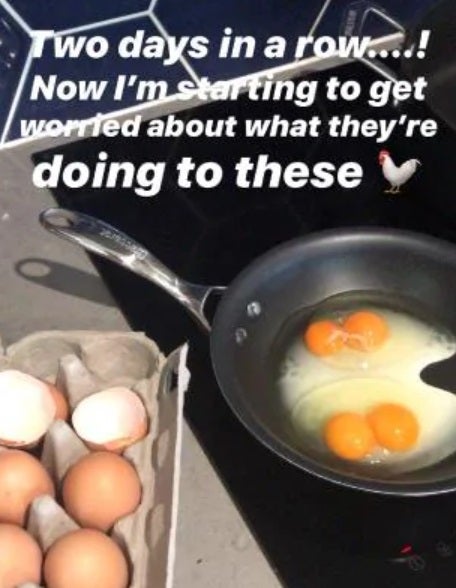One in 10 trillion chance? Woman finds six double-yolk eggs in one box
It is thought the chances of finding one double-yolk egg are around 1/1000. But what about six?

Have you ever cracked a double-yolk egg while making breakfast?
The chances are slim, according to the British Egg Information Service (BEIS).
So slim, in fact, the BEIS puts the odds at around 1/1000 - that's just 0.10 per cent.
So when Corrine Finch cracked open not one, but two double-yolks while making breakfast on Tuesday, she was naturally surprised.
But she was even more shocked to find double-yolks three and four on Wednesday, sharing her find in a post uploaded to Instagram.
And things didn't end there; on Thursday the Australian woman cracked double-yolks five and six - each one from the same box.
This led her to ask the question on everyone's mind: "What are the odds?"
Although it is rare to find so many in one carton, Ms Finch is not the first person to do so and she probably won't be the last.
Luckily, we have an explanation for why Finch found multiple double-yolkers in the same carton.
"You get a young bird and it comes to lay its first egg and it releases more than one egg yolk," Richard Kempsey, an egg supplier told the BBC in 2011.
"It forms a shell around the egg and out pops a rather large egg with two egg yolks in it."
Double-yolk eggs mostly come from young hens aged between 20-to-28 weeks old, Mr Kempsey added.

The chances of getting a double-yolk from one of these hens is much higher. One in every 100 eggs from these birds are double-yolked.
In addition, eggs in a carton are likely to come from the same flock, and flocks are usually around the same age, according to the BBC.
On that basis, you could say that while the chances of finding a double-yolker are 1/1000, the chances of finding a second are higher at 1/100.
If you multiply 1000 x 100 x 100 x 100 x 100 x 100 you get 10,000,000,000,000 - or 10 trillion.
So, the events in Finch's kitchen were a one in 10 trillion chance event? Not quite.
BBC research also revealed that the size of eggs is important when taking into account the frequency at which you might find a double-yolker.
Double-yolk eggs are far more likely to be large, according to the research, yet the eggs that young birds lay are usually small.
Any eggs that are laid would likely be picked out and boxed together.
This means if you find a large double-yolk egg - and you know the other eggs in the box are from the same young flock - then the chance that the other eggs are also double-yolkers becomes a lot more likely.
In the most extreme case, you'd find that if the first egg is a double-yolker, all the eggs are double-yolkers, the BBC reported
Join our commenting forum
Join thought-provoking conversations, follow other Independent readers and see their replies
Comments
Bookmark popover
Removed from bookmarks